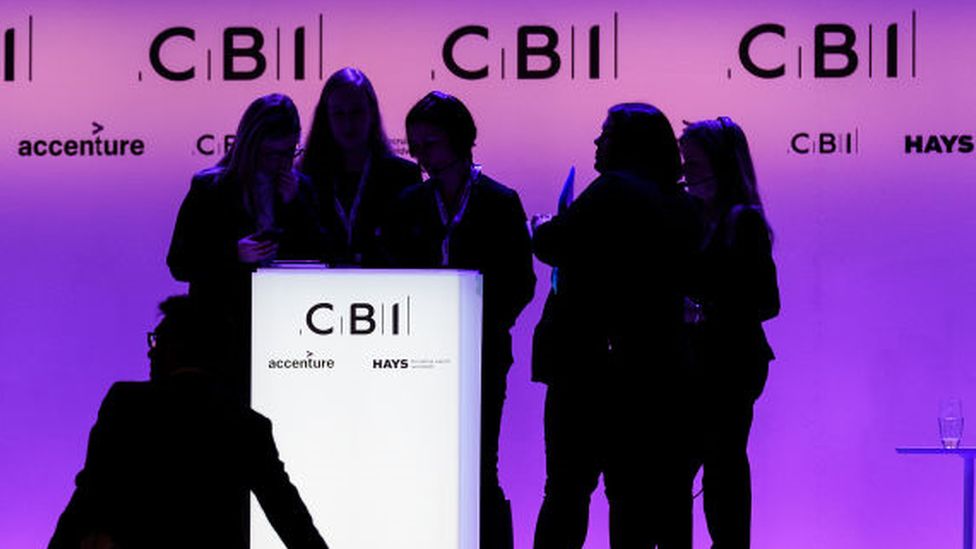CBI hired 'toxic' staff and failed to sack offenders
- Published

The UK's biggest business group has admitted it hired "culturally toxic" staff and failed to fire people who sexually harassed female colleagues.
The CBI said a failure to act allowed a "very small minority" of staff to believe they could get away with harassment or violence against women.
The embattled lobby group said it has now dismissed a number of people.
The CBI was responding to an independent law firm report on misconduct allegations including rape.
In an emotional letter to members, the business lobby group - which claims to represent 190,000 firms - admitted to a series of failings and said it had made mistakes "that led to terrible consequences".
It said there was a collective "sense of shame" at "so badly having let down the...people who came to work at the CBI".
"Our collective failure to completely protect vulnerable employees... and to put in place proper mechanisms to rapidly escalate incidents of this nature to senior leadership.... these failings most of all drive the shame," CBI president Brian McBride said in the letter.
In early April, a number of claims of misconduct and harassment against CBI staff emerged including one allegation of rape at the lobby group's summer party in 2019.
On Friday a second rape allegation emerged, after a woman told the Guardian she was raped whilst working at one of the CBI's overseas offices.
Both rape allegations are being investigated by the police.
In a letter following a report by law firm Fox Williams, which was appointed to lead an independent investigation into the lobby group, the CBI admitted to its members:
- It "tried to find resolution in sexual harassment cases when we should have removed those offenders from our business"
- The failure to sack offenders had led to a reluctance among women to formalise complaints
- This also allowed a "very small minority of staff with regressive - and, in some cases, abhorrent - attitudes towards their female colleagues to feel more assured in their behaviour, and more confident of not being detected"
- It failed to filter out culturally toxic people during the hiring process
- It promoted some managers too quickly "without the necessary prior and ongoing training to protect our cultural values, and to properly react when those values were violated"
- It paid "more attention to competence than to behaviour"
- It failed to properly integrate new staff
The future of the CBI is hanging in the balance and it has suspended its operations until June while it tries to reform its workplace.
There has been a mass exodus of CBI members, with a number of household names including John Lewis, BMW, Virgin Media O2, insurers Aviva, Zurich and Phoenix Group, banking firm Natwest, credit card company Mastercard; B&Q owner Kingfisher and media firm ITV all quitting the group.
The government had already decided to pause any activity with the lobby group, but on Monday, Chancellor Jeremy Hunt said there was "no point" engaging with the CBI when its own members had deserted them.
"We want to engage with a body that speaks or business. It is incredibly important for me when I'm constructing budgets to have someone that I can turn to who speaks for British business."
Mr McBride said he wanted to give members reasons to consider trusting the lobby group again.
But said: "Whether that is possible, I simply don't know."
Mr McBride said he was concerned that CBI staff felt that their only option was to go to the Guardian newspaper - which first published the claims - instead of feeling confident enough to raise the matter internally.
One female CBI worker had told the Guardian that she had been stalked by a male colleague in 2018.
The business group upheld a complaint of harassment against the man however, he was allowed to keep working in the same office as the woman. He eventually left for an unrelated reasons, according to the newspaper.
Earlier this month, the lobby group fired its director-general, Tony Danker, who joined the CBI in 2020, following separate complaints of workplace misconduct.
Mr Danker acknowledged he had made some staff feel "very uncomfortable" and apologised, but said his name had been wrongly associated with separate claims andthat his reputation had been "destroyed".
He is being replaced by Rain Newton-Smith, the CBI's former chief economist, who is returning to the lobby group after a brief stint at Barclays.
Dame Carolyn Fairbairn was the director-general of the CBI between 2015 and 2020. The BBC has contacted her for comment.
'Rebuilding trust'
Mr McBride said the CBI had accepted all 35 recommendations made by Fox Williams investigators and added the organisation had 60 days to produce an action plan for its members to vote one.
The CBI's president said the organisation had to "go for a much more zero-tolerance culture" and get "much more severe in dealing" with incidents of bullying and sexual harassment.
"For us it's about rebuilding the trust that we obviously lost with the members who left us," he said.
But Andy Wood, chief executive of the brewing company Adnams, which has cancelled its membership of the CBI, said he had not heard anything so far that "reassures me that I should become a member of the CBI again".
He said he was not sure if the group was "salvageable".
"Zero tolerance of bullying and sexual harassment - that has to be a given in a modern organisation," Mr Wood said.
"It just shows really how archaic the CBI was behind the scenes. I applaud them for trying to put their house in order but this does feel [like] a few things being done far too late."
Related Topics
- Published22 April 2023
- Published21 April 2023